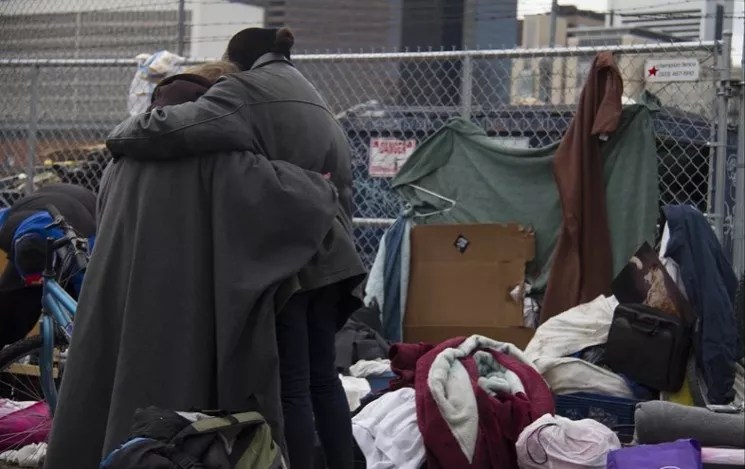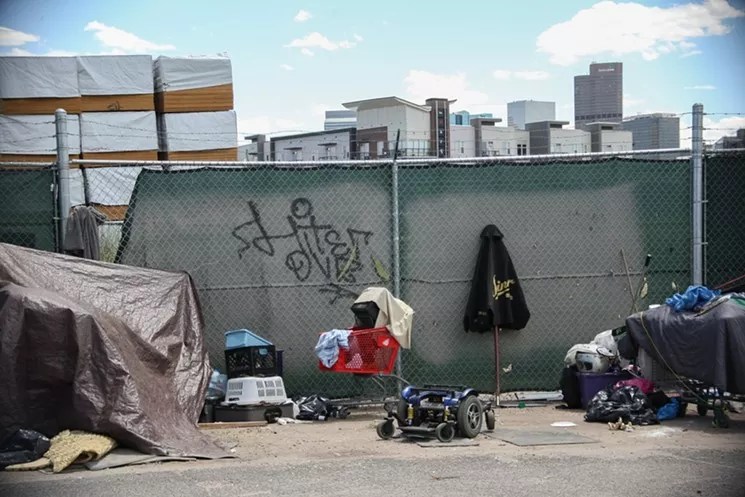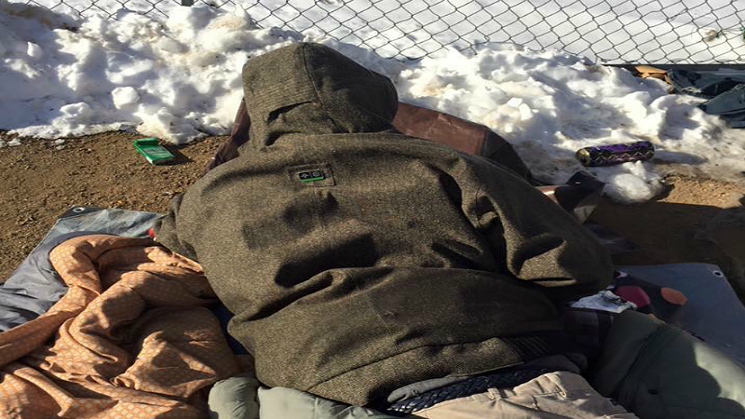
Photo by Kevin Beatty

Audio By Carbonatix
The recent increases in rent throughout the Denver metro area, continuing a trend that’s made the Mile High City one of the country’s most expensive rental markets since 2010, have the potential to push people who are already barely making ends meet into homelessness. Those most at risk include plenty of folks who’ve never been without a roof over their head before, including families and seniors, and have no idea what to do in such a scenario.
“Wages haven’t kept up with this booming economy,” says Cathy Alderman, Colorado Coalition for the Homeless vice president of communications and public policy. “While development and businesses are doing very well, people at lower incomes are not, because their wages aren’t keeping up with rental increases and home-price increases. It’s really shutting out an entire population of our community from participating in the success of this economy.”
Alderman adds: “We do a lot of crane counts in Denver for all the new buildings. But even though there are lots and lots of new apartment units, very few of them are affordable. Most of them are at-market or above-market or in luxury markets for a younger, more professional class of people moving to Denver – and that’s shutting out people with lower incomes.”
“The Gap: A Shortage of Affordable Homes,” a recent report from the National Low Income Housing Coalition accessible below, spells out the scope of the issue in the metro area.
“In the Denver-Aurora-Lakewood market, there’s a deficit of over 60,000 affordable units for people living at 30 percent or below of median income,” Alderman reveals. “And if you bump that up to 50 percent of area median income, that shortage is 86,600 units. We serve the population that’s 50 percent below the median income and focus on people who are 30 percent below – those who are the most vulnerable. And even though we hear a lot about needing a larger workforce and more middle-class housing, the shortages are much worse for people earning median or low incomes.”
An example: “For every 100 units that are needed for people living at 30 percent of area median income or below, there are only 25 available. But for every 100 units needed for people who are living at 100 percent of area median income, there are 99. You can see the disparity.”

Belongings of individuals displaced by a 2016 homeless sweep.
Photo by Brandon Marshall
Given such factors, one of the demographics that can all too easily slip into homelessness “is the aging population and seniors,” she points out. “They’ve been housed, maybe in multiple places, but they’re finding they can no longer afford to live in the house where they’ve been living because they’re on a fixed income. They’ve managed for years, but with the rental market increasing at such a high pace, suddenly they can’t keep up, and there’s no place for them to go.”
This problem is particularly acute “for seniors living in neighborhoods throughout Colorado, but especially in Denver, that are gentrifying. They’ve worked all their life and gotten their retirement and their Social Security. But suddenly the property values have gone up, and if they’re renting, the landlord can choose to raise the rent on them. And that’s not something originally built into their budget.”
Likewise, Alderman confirms, “we’re definitely seeing an increase in families that are homeless. Families aren’t often captured in point-in-time counts or some of the numbers of homeless people that are reported because they’re frequently living with other family members, or they’re splitting their family members up. Some are living with Grandma and Grandpa, or their aunt and uncle will put some of them up. But that means a lot of families are living apart, and that has such an impact on kids and their ability to stay focused in school. When a child is worried about where they’re going to sleep at night, there’s no way they can concentrate on reading and math.”
Families without homes present an extra challenge for organizations such as CCH, she concedes. “When you have an individual who’s homeless, you can often get him into a motel for the night. But for families, you need a little more space, and if they’re struggling to get by, the increasing weekly and monthly rates that some motels are charging increases the pressure on them. Maybe they’re trying to save for a deposit on a rental unit or waiting for a unit to become available. That’s hard to do when they’re trying to make that weekly or monthly payment.”
Moreover, Alderman continues, “there aren’t that many sheltering options for families. They’re often relying on churches and nonprofits to open their doors, because there are so few local, state and federally funded family shelters, and those spots are pretty much always taken. And that can really increase the trauma that we see as being a main factor for people experiencing homelessness. Most people experience some sort of trauma that leads them into homelessness, but for a child, homelessness itself is often the trauma they’re carrying with them every day. They might be afraid to tell their teacher or friends at school what’s happening to them, so they don’t develop the ability to make social connections. And if they’re worried about when they’re going to eat, that can really have an impact on their intellectual and social development.”

Trying to stay warm on a cold day.
Photo by PJ D’Amico
Homeless adults, meanwhile, must deal with scenarios whose difficulties can seem even greater when they never expected to face them.
“We’ve seen a lot of families who have always gotten by and both parents had good jobs,” she reveals. “But then, suddenly, one of them gets laid off. That causes a disruption in the family that can sometimes lead to separation. And if it’s a single parent, they may not know how they’re going to pay the rent if they’re not bringing in an income and how quickly they’ll be evicted if they don’t.”
Shelters aren’t a panacea, either, particularly for families. According to Alderman, “we haven’t seen new shelters open up, so we still have the same number of limited beds or units even as we’re seeing more homeless families. That’s not to say every shelter is full to capacity every night. But some people prefer to stay in cars or stay with family members or sleep outside when weather permits, because shelters can be a traumatizing experience when you have a lot of people in the same space and you’re worried about your belongings and your health.”
For the coalition, Alderman says, “it’s so important for us to get people and families who are at risk of homelessness or about to enter it housed as quickly as possible, so they don’t have to spend their limited resources on expensive motels or just on trying to get by. It’s difficult to become re-employed if you don’t have a place to take a shower, and all the factors of not having a stable home really impact everything else. And once people are housed, we try to provide them with connection services, like health services and mental health services and job services. Because the idea is to get them back on their feet again.”